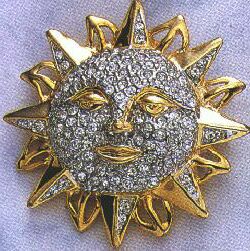Homer's Hymns

 To Ares
To Ares
Ares, exceeding in strength, chariot-rider, golden-helmed, doughty in heart, shield-bearer, Saviour of cities, harnessed in bronze, strong of arm, unwearying, mighty with the spear, O defence of Olympus, father of warlike Victory, ally of Themis, stern governor of the rebellious, leader of righteous men, sceptred King of manliness, who whirl your fiery sphere among the planets in their sevenfold courses through the aether wherein your blazing steeds ever bear you above the third firmament of heaven; hear me, helper of men, giver of dauntless youth! Shed down a kindly ray from above upon my life, and strength of war, that I may be able to drive away bitter cowardice from my head and crush down the deceitful impulses of my soul. Restrain also the keen fury of my heart which provokes me to tread the ways of blood-curdling strife. Rather, O blessed one, give you me boldness to abide within the harmless laws of peace, avoiding strife and hatred and the violent fiends of death.
 To Earth the Mother of All
I will sing of well-founded Earth, mother of all, eldest of all beings. She feeds all creatures that are in the world, all that go upon the goodly land, and all that are in the paths of the seas, and all that fly: all these are fed of her store. Through you, O queen, men are blessed in their children and blessed in their harvests, and to you it belongs to give means of life to mortal men and to take it away. Happy is the man whom you delight to honor! He has all things abundantly: his fruitful land is laden with corn, his pastures are covered with cattle, and his house is filled with good things. Such men rule orderly in their cities of fair women: great riches and wealth follow them: their sons exult with ever-fresh delight, and their daughters in flower-laden bands play and skip merrily over the soft flowers of the field. Thus is it with those whom you honor O holy goddess, bountiful spirit.
Hail, Mother of the gods, wife of starry Heaven; freely bestow upon me for this my song substance that cheers the heart! And now I will remember you and another song also.
To Earth the Mother of All
I will sing of well-founded Earth, mother of all, eldest of all beings. She feeds all creatures that are in the world, all that go upon the goodly land, and all that are in the paths of the seas, and all that fly: all these are fed of her store. Through you, O queen, men are blessed in their children and blessed in their harvests, and to you it belongs to give means of life to mortal men and to take it away. Happy is the man whom you delight to honor! He has all things abundantly: his fruitful land is laden with corn, his pastures are covered with cattle, and his house is filled with good things. Such men rule orderly in their cities of fair women: great riches and wealth follow them: their sons exult with ever-fresh delight, and their daughters in flower-laden bands play and skip merrily over the soft flowers of the field. Thus is it with those whom you honor O holy goddess, bountiful spirit.
Hail, Mother of the gods, wife of starry Heaven; freely bestow upon me for this my song substance that cheers the heart! And now I will remember you and another song also.

To Helios
And now, O Muse Calliope, daughter of Zeus, begin to sing of glowing Helios whom mild-eyed Euryphaessa, the far-shining one, bare to the Son of Earth and starry Heaven. For Hyperion wedded glorious Euryphaessa, his own sister, who bare him lovely children, rosy-armed Eos and rich-tressed Selene and tireless Helios who is like the deathless gods. As he rides in his chariot, he shines upon men and deathless gods, and piercingly he gazes with his eyes from his golden helmet. Bright rays beam dazzlingly from him, and his bright locks streaming from the temples of his head gracefully enclose his far-seen face: a rich, fine-spun garment glows upon his body and flutters in the wind: and stallions carry him. Then, when he has stayed his golden-yoked chariot and horses, he rests there upon the highest point of heaven, until he marvelously drives them down again through heaven to Ocean.
Hail to you, lord! Freely bestow on me substance that cheers the heart. And now that I have begun with you, I will celebrate the race of mortal men half-divine whose deeds the Muses have showed to mankind.
The story of Ares and Aphrodite
(Okay, this isn't really one of Homer's hymns, but it was a good excuse for me to use another picture of Kevin Smith who plays Ares.)

But the minstrel struck the chords in prelude to his sweet lay and sang of the love of Ares and Aphrodite of the fair crown, how first they lay together in the house of Hephaestus secretly; and Ares gave her many gifts, and shamed the bed of the lord Hephaestus. But straightway one came to him with tidings, even Helius, who had marked them as they lay together in love. And when Hephaestus heard the grievous tale, he went his way to his smithy, pondering evil in the deep of his heart, and set on the anvil block the great anvil and forged bonds which might not be broken or loosed, that the lovers might bide fast where they were. But when he had fashioned the snare in his wrath against Ares, he went to his chamber where lay his bed, and everywhere round about the bed-posts he spread the bonds, and many too were hung from above, from the roof-beams, fine as spiders' webs, so that no one even of the blessed gods could see them, so exceeding craftily were they fashioned. But when he had spread all his snare about the couch, he made as though he would go to Lemnos, that well-built citadel, which is in his eyes far the dearest of all lands. And no blind watch did Ares of the golden rein keep, when he saw Hephaestus, famed for his handicraft, departing, but he went his way to the house of famous Hephaestus, eager for the love of Cytherea of the fair crown. Now she had but newly come from the presence of her father, the mighty son of Cronos, and had sat her down. And Ares came into the house and clasped her hand and spoke and addressed her:
“Come, love, let us to bed and take our joy, couched together. For Hephaestus is no longer here in the land, but has now gone, I ween, to Lemnos, to visit the Sintians of savage speech.”
Back to main menu


 To Earth the Mother of All
I will sing of well-founded Earth, mother of all, eldest of all beings. She feeds all creatures that are in the world, all that go upon the goodly land, and all that are in the paths of the seas, and all that fly: all these are fed of her store. Through you, O queen, men are blessed in their children and blessed in their harvests, and to you it belongs to give means of life to mortal men and to take it away. Happy is the man whom you delight to honor! He has all things abundantly: his fruitful land is laden with corn, his pastures are covered with cattle, and his house is filled with good things. Such men rule orderly in their cities of fair women: great riches and wealth follow them: their sons exult with ever-fresh delight, and their daughters in flower-laden bands play and skip merrily over the soft flowers of the field. Thus is it with those whom you honor O holy goddess, bountiful spirit.
Hail, Mother of the gods, wife of starry Heaven; freely bestow upon me for this my song substance that cheers the heart! And now I will remember you and another song also.
To Earth the Mother of All
I will sing of well-founded Earth, mother of all, eldest of all beings. She feeds all creatures that are in the world, all that go upon the goodly land, and all that are in the paths of the seas, and all that fly: all these are fed of her store. Through you, O queen, men are blessed in their children and blessed in their harvests, and to you it belongs to give means of life to mortal men and to take it away. Happy is the man whom you delight to honor! He has all things abundantly: his fruitful land is laden with corn, his pastures are covered with cattle, and his house is filled with good things. Such men rule orderly in their cities of fair women: great riches and wealth follow them: their sons exult with ever-fresh delight, and their daughters in flower-laden bands play and skip merrily over the soft flowers of the field. Thus is it with those whom you honor O holy goddess, bountiful spirit.
Hail, Mother of the gods, wife of starry Heaven; freely bestow upon me for this my song substance that cheers the heart! And now I will remember you and another song also.
